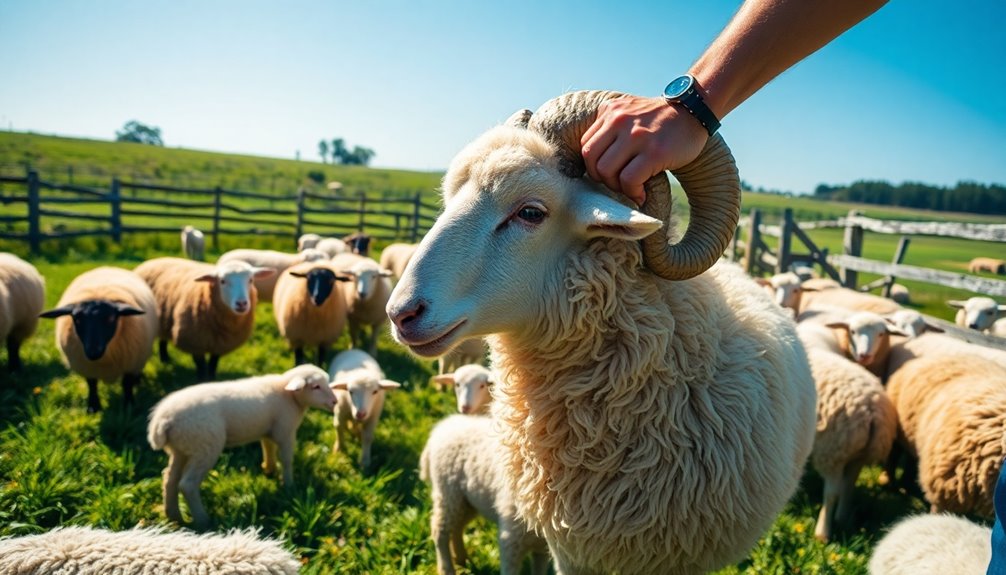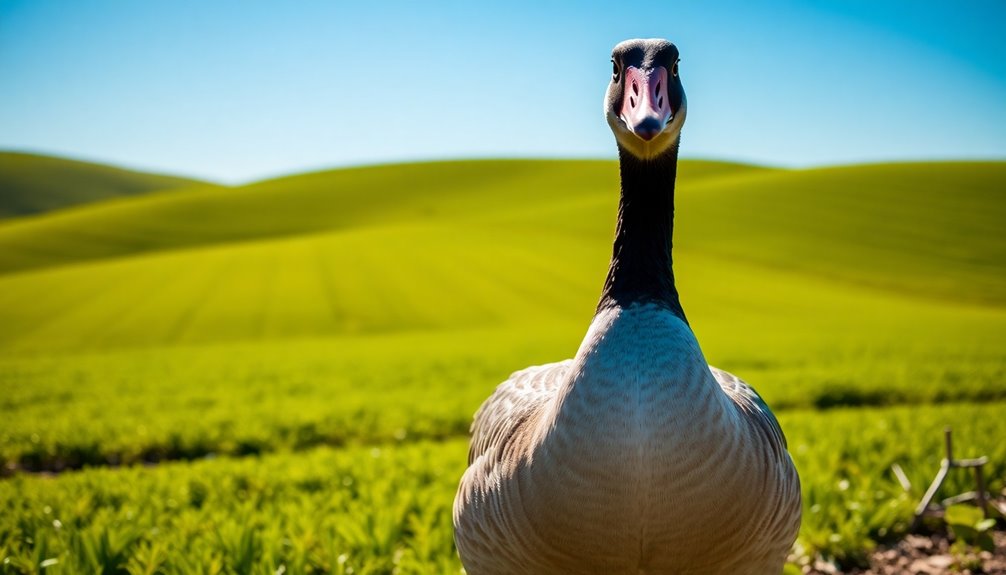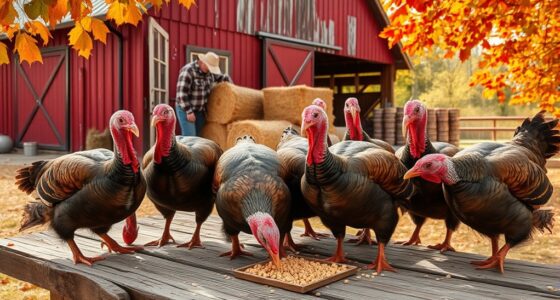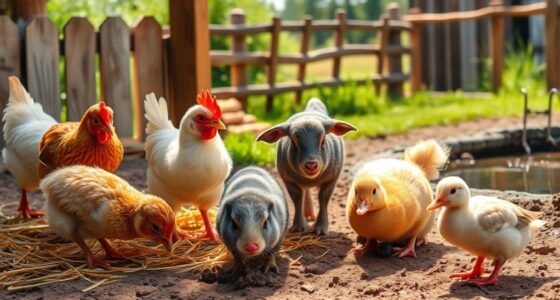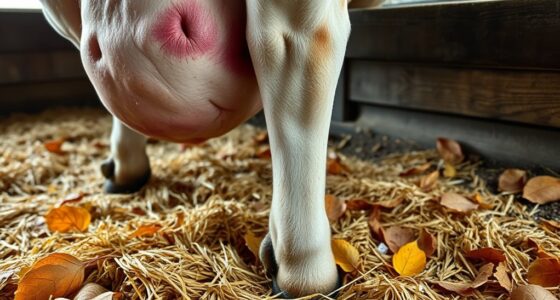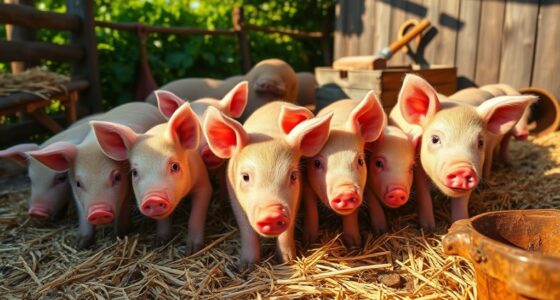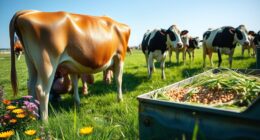Buying sheep involves careful thought to choose the right flock for your farm. First, clarify your purpose—are you interested in wool, meat, or companionship? Research local breeds that thrive in your climate, like Merino for wool or Suffolk for meat. Look for reputable breeders and inspect their farms for health standards. Avoid sale barns to reduce the risk of unhealthy animals. Prepare your facilities with proper fencing and shelter, and guarantee you can meet their dietary needs. With the right approach, you'll find the ideal flock to suit your needs and grow your farm. Discover more tips below!
Key Takeaways
- Determine the purpose of your flock, focusing on wool, meat, dairy, or companionship to select suitable breeds.
- Research reputable local breeders and inspect their facilities to ensure animal health and cleanliness.
- Choose breeds adaptable to your local climate and pasture conditions for optimal growth and productivity.
- Prepare your facilities with strong fencing, clean environments, and adequate shelter for the sheep's safety and comfort.
- Plan for long-term management by monitoring health, implementing rotational grazing, and maintaining detailed records of flock care.
Benefits of Raising Sheep
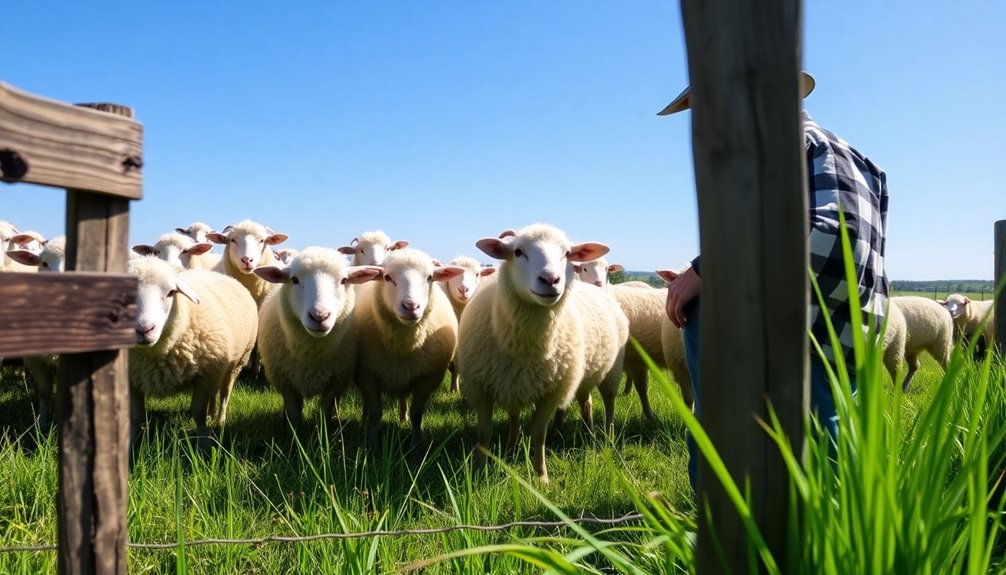
Raising sheep can be a rewarding endeavor, offering a blend of economic potential and personal satisfaction.
One of the primary benefits of raising sheep is their versatility; you can profit from both meat and wool. By connecting with local sheep breeders, you can find experienced sheep that suit your needs, whether you're starting a small flock or expanding your operations.
Sheep are hardy and low-maintenance, making them ideal for new farmers. Their minimal facility requirements mean you can get started with a low initial investment.
During the breeding season, well cared for ewes can produce healthy lambs, enhancing your flock's potential. Plus, you'll have access to fresh meat and wool, contributing to sustainable farming practices.
Selecting the Right Breeds
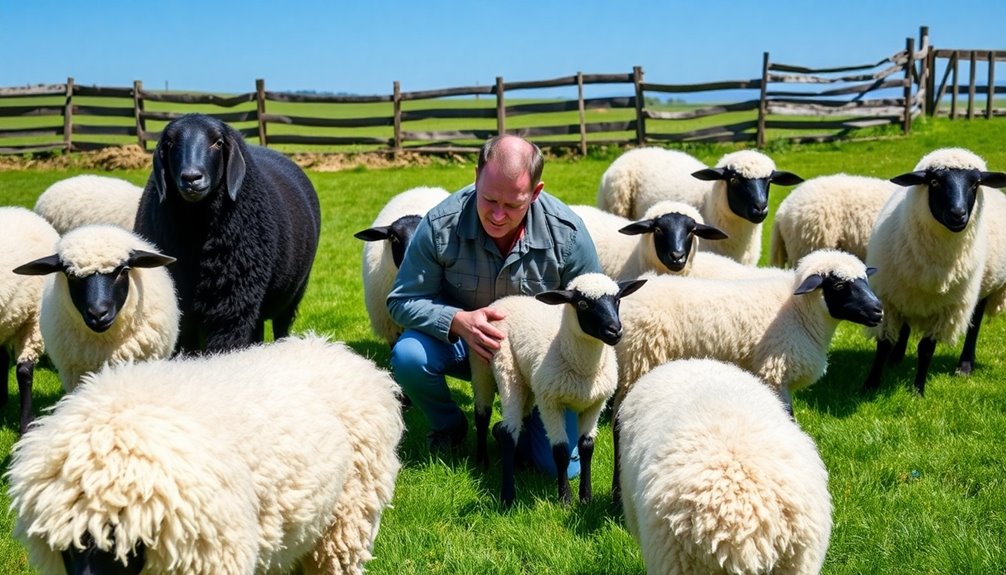
Choosing the right breed of sheep is essential for your farming success, as it directly impacts your goals and the management of your flock. First, determine whether you're raising sheep for wool and meat, dairy, or companionship. Popular breeds include Merino for wool and Suffolk for meat. If you want versatility, consider dual-purpose breeds like Columbia.
When selecting breeds, think about your local climate and pasture conditions. Some sheep thrive in specific environments, so consult with local breeders for insights. Also, keep in mind the care for your flock, especially if you have pregnant ewes, as their needs can differ.
| Breed Type | Example Breeds | Purpose |
|---|---|---|
| Wool | Merino, Lincoln | High-quality fleece |
| Meat | Suffolk, Hampshire | Fast growth |
| Dual-Purpose | Columbia, Corriedale | Wool and meat |
Essential Purchasing Tips
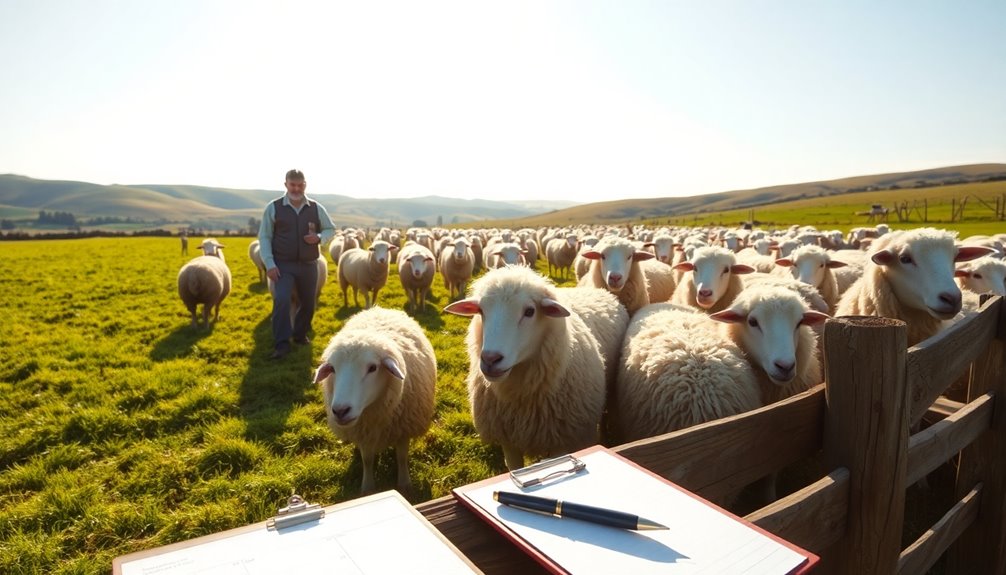
Once you've settled on the right breeds for your flock, it's time to focus on how to buy them effectively.
Start by researching local sheep breeders known for their reputable source and sound health practices. Always inspect the seller's farm for cleanliness and animal health, checking for proper vaccinations and effective parasite control.
Avoid sale barns, as they often present a high risk of acquiring culls. Verify the sheep's diet and health history, including vaccination records and parasite management strategies.
Additionally, consider the long-term costs of ownership, such as feed, veterinary care, and facility maintenance, to guarantee your investment aligns with your farming goals, especially if this is your first flock.
Making informed choices pays off in the long run.
Preparing Your Facilities
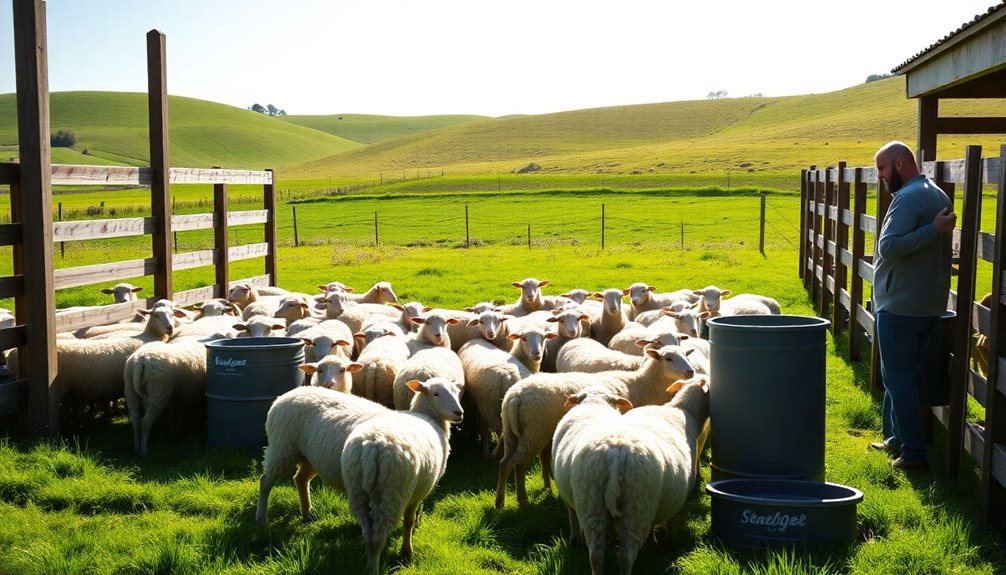
Before you bring your new flock home, it's important to get your facilities ready.
Start by making sure your fencing is strong and predator-proof. Use materials like woven wire or electric fencing to keep your sheep safe from threats like dogs and coyotes.
Next, create a clean environment by checking for hazards and eliminating areas where sheep could get stuck.
Provide adequate shelter that offers shade in the summer and protection from wind in the winter. A three-sided shelter works well for ventilation.
Make certain you have enough feed and fresh water, planning for about 15 bales of hay per ewe during winter.
Finally, regularly monitor and maintain your facilities to guarantee a safe and healthy environment for your flock.
Long-Term Flock Management
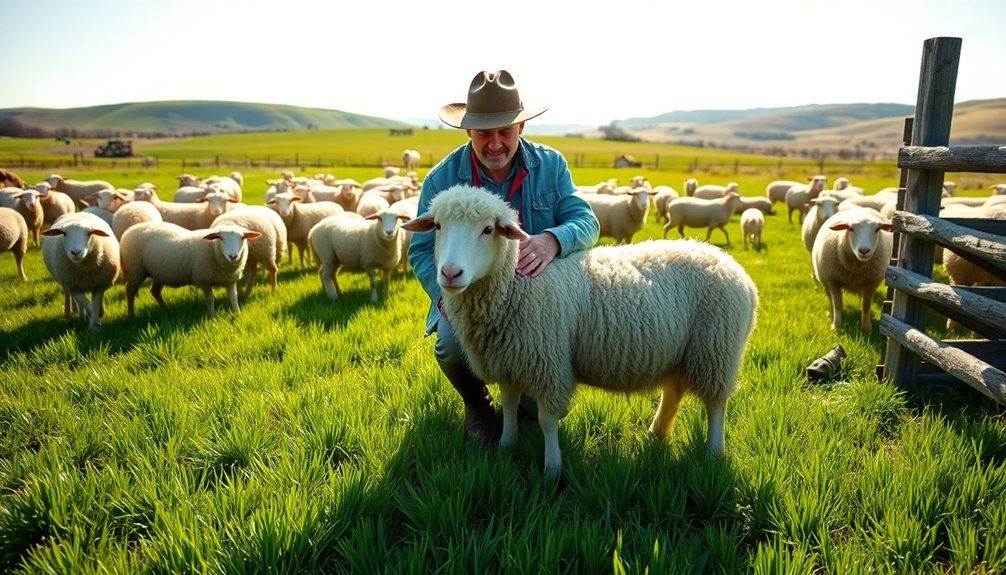
Effective long-term flock management is crucial for maintaining the health and productivity of your sheep. When you buy sheep, focus on genetics and regularly assess your flock to cull problematic animals, guaranteeing peak flock health.
Implement rotational grazing to enhance pasture management, improve forage use, and reduce parasites. Regular veterinary care, including vaccinations and health check-ups, is essential for preventing diseases and maintaining overall well-being.
Always monitor your sheep for signs of illness; early detection can save lives. Keep detailed records of breeding, health treatments, and feed management to refine your strategies.
Make sure your sheep have ample indoor space and fresh water to thrive, making your raising sheep experience more rewarding.
Frequently Asked Questions
What Are 3 Factors to Consider When Choosing a Ewe Breed?
When choosing a ewe breed, consider the primary purpose for raising them—whether for wool, meat, or both.
Next, evaluate your local climate and pasture conditions, as certain breeds thrive in specific environments.
Finally, think about the breed's management needs; some require more intensive care while others are low-maintenance.
Researching reproductive characteristics will help you select ewes that are productive and suited to your farming goals.
How Many Sheep Should a Beginner Start With?
Think of it like starting a rock band; you wouldn't want to go solo!
For beginners, starting with at least five sheep is ideal, as they're social animals that thrive in groups. If you're not ready for five, aim for at least three or four to keep the flock dynamic.
How to Select a Good Sheep?
To select a good sheep, start by inspecting its living environment; it should be clean and offer fresh water and quality pasture.
Check the sheep's physical condition using body condition scoring, aiming for a score of around 3.
Ask about vaccination history and parasite management.
Perform a FAMACHA test to assess worm burden, and guarantee the seller can provide detailed information about the sheep's diet and health history for transparency.
How Many Sheep for 1 Acre?
When considering how many sheep you can have on one acre, you'll want to look at your pasture quality.
Generally, you can keep 3 to 5 sheep per acre, but lush, well-maintained pastures can support more.
If your land is overgrazed or in poor condition, you'll need to reduce that number.
Consulting local shepherds can also give you tailored advice based on your area's climate and grazing patterns.
Conclusion
So, you're ready to plunge into the fantastic world of sheep farming! With the right breed, savvy purchasing tips, and well-prepared facilities, you'll be on your way to creating a flock that's nothing short of legendary. Your farm could become the envy of sheep enthusiasts everywhere, bursting with healthy, happy sheep that practically frolic through fields of gold! Embrace the journey, and soon you'll be the proud shepherd of a flock that'll make the hills sing.

